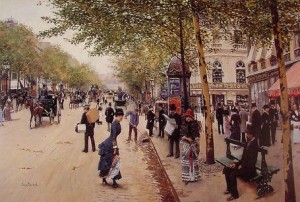A little while ago, while playing pétanque in Lamorinda, I purchased half a dozen French books from sassy Carolina Jones.
Mostly classics. Maupassant, Zola, Maurois, Flaubert, etc… whose works I had read in my younger years, and mostly forgotten.
I thought that it would be fun to read them again fifty years later.
I started with Bel Ami, written by Guy de Maupassant and published in 1885.
The date is important because it reflects the mood and the thoughts of the French society of that era.
That glorified period was called “La Belle Epoque” (The Beautiful Era).
La Belle Epoque started roughly at the end of the Franco-Prussian war of 1870 and ended in 1914, at the beginning of World War One.
It seems that at that time, one hundred years after the French chopped off thousands of aristocratic heads, everybody was enamored again with titles and nobility.
Everybody aspired to have a name with a nobiliary particle, just like Duroy, the protagonist of Bel Ami.
It also seems that everybody had a mistress. In those days you could not decently show your face in society if you did not have a paramour.
Felix Faure, the president of France at that time had naturally a mistress (noblesse oblige), and reportedly died while she (Marguerite Steinheil) was performing oral sex on him.
France had a good laugh and many literati and politicians exploited that event to the fullest.
“George Clemenceau‘s epitaph of Faure, was “Il voulait être César, il ne fut que Pompée” (it could mean “he wished to be Caesar, but ended up as Pompey“, or “he wished to be Caesar and ended up being blown”: the verb “pomper” in French is also slang for performing oral sex on a man).”
La Belle Epoque was also a time of pervading anti-Semitism. I had forgotten but was shocked when I came across the following paragraph in Bel-Ami:
« Le patron ? Un vrai juif ! Et vous savez, les juifs on ne les changera jamais. Quelle race ! et cita des traits étonnante d’avarice, de cette avarice particulière aux fils d’Israël, des économies de dix centimes, des marchandages de cuisinière, des rabais honteux demandés et obtenus, toute une manière d’être d’usurier, de prêteurs à gages. »
The boss? A true Jew! And you know, the Jews they will never change. What a breed! And he mentioned amazing traits of greed, this greed so particular to the sons of Israel, ten-cent savings, despicable bargaining, shameful discounts demanded and obtained, always acting like usurers, pawnbrokers.
Like the thousands of greedy bastards on this earth could only be found among a handful of Chosen (for persecution) People!
No wonder that the Dreyfus Affair (1894-1906) exploded (and lingered) in such a noxious context.
“Captain Alfred Dreyfus was wrongly convicted of treason, with fabricated evidence from French government officials. Anti-Semitism directed at Dreyfus, and tolerated by the general French public in everyday society, was a central issue in the controversy and the court trials that followed. Public debate surrounding the Dreyfus Affair grew to an uproar after the publication of J’accuse, a letter sent to newspapers by prominent novelist Emile Zola, condemning government corruption and French anti-Semitism.”
Besides anti-Semitism, it was also a time when French Imperialism was in its prime. A third of Africa, Syria, Indochina, Madagascar and a multitude of outposts were under French control and ruthlessly exploited.
Those colonies eventually spawned bloody wars of independence and cost countless of French lives.
Reading those old books proved a rewarding experience because “Those who ignore history are bound (or doomed) to repeat it” and la Belle Epoque was only “belle” for those who could afford its glitter and excesses.
Just as it is today!
Alain

